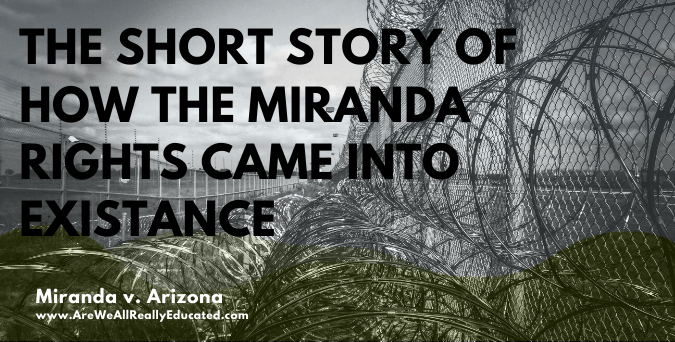Are you aware of how the Miranda Rights came into affect? Here is the short story!
A man by the name of Ernesto Miranda was accused of kidnapping and raping an 18-year-old, mildly retarded lady in 1963. He was brought in for questioning where he confessed to the crime. He wasn’t told that he did not have to speak or that he could have a lawyer present there. At trial, Miranda’s lawyer attempted to get the confession thrown out, but the motion was denied.
Then in 1966, Supreme Court was involved and heard the case. Supreme Court rule that, the statements made to the police could not be used as evidence, since Miranda had not been advised of his rights beforehand.
So because of that, it was ruled that, before any one goes into questioning, the police are required to read you your Miranda Rights, also known as the Miranda warning. This is under ruling Miranda v. Arizona.
While the Miranda statement can be recited a few different ways, they all have these 2 key elements: the right to remain silent and the right to an attorney
It has been said that, when you are read your rights, you have been “Mirandized.”
It is important to know that, one does not need to be Mirandized to be arrested. The reason is because, there is a difference between being arrested and being questioned.
Basic questions, such “what’s your name? What’s your address? What is your social security number and where are you from?” does not need to be covered by a Miranda warning. Also, if you are not a suspect in a crime, the police do not need to Mirandize someone.
If you’re ever being investigated for a crime and wish to remain silent before being Mirandized, you can let the officer know that your attorney told you to never speak to law enforcement without talking to him or her first.
So what happened to Ernesto Mirando?
Believe it or not, his conviction was thrown out, even though he confessed to doing the crime. The police had other evidence against Miranda and when he was questionned and challenged for a second time, he was convicted again and served prison time.
After his release from prison, Miranda’s life ended in 1976 in a barrom brawl.
The following is a minimal Miranda warning, as outlined in the Miranda v Arizona case.
“You have the right to remain silent. Anything you say can and will be used against you in a court of law. You have the right to be speak to an attorney, and to have an attorney present during any questioning. If you cannot afford a lawyer, one will be provided for you at government expense.”
The following is a much more verbose Miranda warning, designed to cover all bases that a detainee might encounter while in police custody. A detainee may be asked to sign a statement acknowledging the following.
You have the right to remain silent and refuse to answer questions. Do you understand?
Anything you do say may [can and will] be used against you in a court of law. Do you understand?
You have the right to consult an attorney before speaking to the police and to have an attorney present during questioning now or in the future. Do you understand?
If you cannot afford an attorney, one will be appointed for you before any questioning if you wish. Do you understand?
If you decide to answer questions now without an attorney present you will still have the right to stop answering at any time until you talk to an attorney. Do you understand?
Knowing and understanding your rights as I have explained them to you, are you willing to answer my questions without an attorney present?
The Miranda Warning only warns of the Constitutional Amendment Article V right against self-incrimination, not mentioning the remainder of Article V rights:
No Person shall be held to answer for a capital, or otherwise Infamous Crime, unless on a Presentment or Indictment of a Grand Jury, except in Cases arising in the Land or Naval forces or in the Militia, when in actual Service in Time of War or public Danger; nor shall any Person be subject for the same Offence to be Twice put in jeopardy of Life or Limb; nor shall be compelled in any Criminal Case to be a Witness against himself; nor be deprived of Life, Liberty, or Property, without due Process of Law; nor shall private Property be taken for public Use, without just Compensation.
It does not cover the Amendment Article IV rights – The Right of the People to be secure In their Persons, Houses, Papers, and Effects, against unreasonable Searches and Seizures, shall not be violated, and no Warrants shall issue, but upon probable Cause, supported by Oath or Affirmation, and particularly describing the Place to be searched, and the Persons or Things to be seized.
Sources:








Leave A Comment